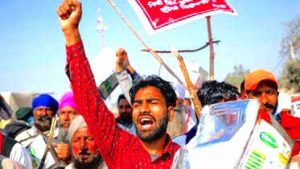Farmers, Workers, Students, Soldiers: Earth-shaking Protests in India Create Possibility of Mass Communist Party

DELHI (India), December 28 — “I will never forget the last week of November,” said Satish, a new young comrade. “Farmers and their supporters overrunning barricades, water cannons, teargas shells. Entrenched barricades did not stop them. When one group retreated, others joined. There were thousands and thousands of them in every direction. They were all demanding Delhi Chalo (March to Delhi). The police were outnumbered.”
Satish took part in these earthshaking events. He did not know about the International Communist Workers’ Party (ICWP) before, but now he is ready to mobilize the masses for communism.
“Is it possible?” another comrade asked. “Can communism win under the leadership of the masses mobilized by ICWP?”
Satish answered emphatically: “My life has changed. I cannot go back.” He was thinking of the future. “Communism for me is a society without the bosses, they are responsible for every problem we have. I did not know anything about communism a month ago. I was angry, my family was struggling to bring food to the table.”
There are over a million farmers like Satish. They are angry and willing to march on Delhi. But the leaders of various farmers’ groups are holding them back. Instead of advancing to Delhi, they have retreated to the outskirts. They are negotiating with the very same bosses that made Satish and millions like him angry.
The union leaders’ demands reflect their politics of making farmers dependent on becoming successful small capitalists. The capitalist bosses want to do away with small farmer-owners. They want complete control by huge corporations that also distribute farm products. Two of the largest owners, Ambani’s Reliance Group and Adani, have amassed $50 billion (5000 crore rupees) during the pandemic, making them among the world’s largest capitalists.
The demands of the millions flooding Delhi and protesting throughout India will not be satisfied by farmers’ unions or large capitalist owners.
“Why don’t we fight for a system that will abolish money and private ownership of land?” asked one of the two dozen comrades visiting the farmers’ encampments. “We will all work just like the farmers are in Delhi. We cook. We produce. We take care of the sick people. We build houses. We do not have to get the permission of the bosses. We can do everything with the power of the working class.”
It makes sense to Satish. He is determined to recruit many more: “Modi is no match for farmers and soldiers marching in millions. He is nobody. The whole system will collapse.”
“Look at my village,” Satish continued. “Almost every poor family has a son who is in the military. Many poor farmers were in the military. And they want us to fight against China when we are struggling.” Sikhs from Punjab have joined the military in large numbers. They have paid a heavy price fighting to defend capitalists like Adani and Ambani. A steady stream of wounded and dead coming home to Punjab adds to the agony of the poor in its villages. War inflicts violence on workers on even a larger scale than capitalism’s daily attacks.
Now comrade Satish is thinking about the pogroms in Delhi last December. Over five hundred, mostly Muslims, were killed by fascist Modi. Many more were killed in Uttar Pradesh. Every house in its Muslim neighborhood was burnt, properties were damaged. Communist internationalism is the only way to respond to long-term capitalist campaigns promoting racism, caste divisions and religious prejudice.
Satish recalled a Sikh Langar (community kitchen) that came from Punjab to Delhi to help Muslim workers. The Langar food was collected by extremely poor Punjabi village farmers for the starving masses of Muslims. When they arrived at the Delhi gate, there was overwhelming Sikh-Muslim solidarity. But Modi’s fascist police blocked them from distributing food. Then the Langar organizers threatened that masses would block railway traffic in Punjab, cutting off the food supply to all of India. The blockade was lifted overnight.
The times are changing. Two years ago, ICWP comrades joined a student protest at Jawaharlal Nehru University. They brought the idea of communism to the masses. There was fierce opposition from many who believed that we must fight first for socialism. We showed the masses that every avenue to socialism leads to capitalist wage slavery.
Our members grew in small numbers. But when millions of migrant workers were forced to leave their city homes, we participated and organized food distribution. We made more contacts and more of our comrades joined.
We are entering a critical stage of our movement. Millions of farmers, 250 million industrial workers, soldiers, and ex-soldiers show the possibility of a communist revolution. We see signs of the masses rejecting wage slavery’s old ways of living. More new comrades like Satish joining ICWP and recruiting many others shows that communism is on the horizon.
Front page of this issue

